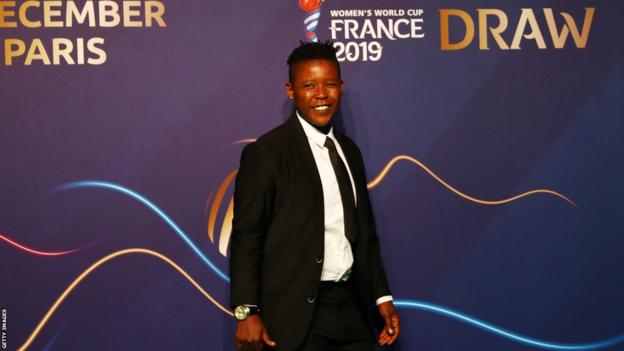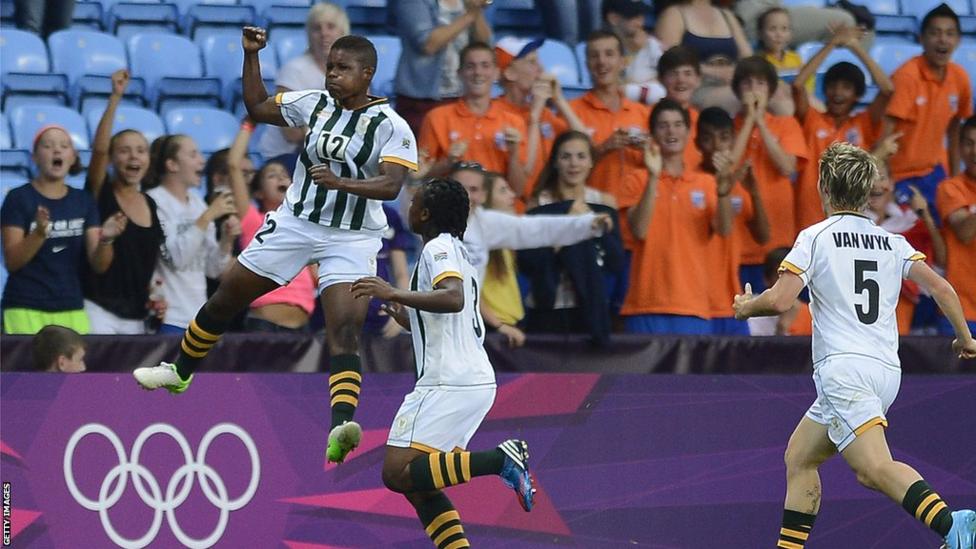Former South Africa captain Portia Modise has lashed out at the country’s football association for what she sees as a lack of support for the women’s game, saying she used to change “under trees” in her playing days.
Banyana Banyana’s preparations for this month’s Women’s World Cup have been hit by a dispute between the squad and the South African Football Association (Safa), something that disrupted Sunday’s final warm-up game on home soil.
A makeshift team of players from local leagues, including a 13-year-old girl, eventually fulfilled the fixture which Botswana won 5-0.
Modise, who scored 102 goals in 124 appearances for her country, says trouble has been brewing since the start of her own playing days.
“It’s about time the girls stood together to fix whatever is happening right now in terms of their contracts and their payments,” Modise told the BBC World Service.
“We have been experiencing this for so many years. I’m the only one who has been vocal about this issue. We’ve been in this journey – it’s been long now – (including) my playing days I could say it’s been 25 years trying to solve this issue.
“The unfortunate part is, if they wanted to fix this, they knew about these problems a long time ago. We have been venting about gender equality – how women are being treated unfairly.
“They were going to come back and have a better structure, plan and contracts for women’s football but they let it drag because they don’t want to do the right things for women’s football.
“So that is why these girls felt the need to stand up – it’s so embarrassing to play for a national team that can’t even afford to maintain your career.”
‘You stay loyal to your team’
Modise played for South African club sides Soweto Ladies and Palace Super Falcons and was nominated for the Women’s Fifa World Player of the Year in 2005.
The 39-year-old was the player of the tournament at the women’s African Football Championship in 2006 and represented her country at the London Olympics in 2012, scoring a breathtaking goal against Sweden from inside the centre circle.
Modise retired in 2015 and is concerned lessons are not being learned, including by current coach Desiree Ellis, who took charge of the makeshift team against Botswana instead of striking with her players, who last year beat Morocco to lift the Women’s Africa Cup of Nations for the first time.
“I felt she needed to stand firm as a leader of the team,” she added.
“She just selected 32 players for the World Cup and when that is being disrupted, you’re supposed to show loyalty and say: ‘this was not my team’.
“The coach made a poor decision to sit in that bench. She needed to be loyal to the players that brought the Africa Cup of Nations home and made the country proud.
“When you’ve been given a team with a short space of time, you don’t take that job. You stay loyal to your team.”
The BBC have asked for a response but have been told “the team” do not want to comment at this stage.

Former South Africa men’s captain Lucas Radebe recently told the BBC that he believes there is a need for reform of the “politics involved” within the administration of the sport as a whole in his country.
The ex-Leeds United defender, 54, voiced his concerns about the failures on the pitch for more than a decade for the men and the lack of former players involved in the Safa.
Speaking to BBC Sport Africa last month, Modise shared her concerns about her experiences with an FA that is bidding to host the Women’s World Cup in 2027.
“We found ourselves changing under the trees and you hid so that people would pass because there was no sports bras. That is not fair,” she said.
“I invested a lot and sometimes I wish to cry. Why were you adopting me if you are still going to suppress me? Adopt me, make my life easier and pay me, let me earn a living through football.
“I look back at my sacrifices, my hard work, where I come from in Soweto – my background didn’t give me many options to become the best footballer.
“Staying in the shacks was not easy.”
‘I found myself with depression’
The striker was the first African player, male or female, to reach 100 international goal in a career that saw her handed her international debut at 16.
Modise says she had to ask neighbours for money through her career to help her maintain her international career and it took its toll.
“I found myself with depression, but at that time I didn’t know what it was,” she added.
“I managed to escape the depression. I just wanted to play football. You can imagine you are seen as a football star but you are staying in a shack.
“I don’t have football clothes – I decided to give it away because those clothes were depressing. You will never see those things in my house.”
When BBC Sport Africa contacted Safa about Modise’s comments last month, the association said it would not entertain Modise, adding, “she has been critical of the FA for a long time now but at the same time we have helped her in much ambassadorial work either in government, FIFA and CAF”.
Safa recently appoint Lydia Monyepao as its CEO, becoming the first woman to hold this position, replacing Tebogo Motlanthe.
Its bid to host the Women’s World Cup in 2027 received an overwhelming response last month from the attendees and Council of Southern Africa Football Associations (Cosafa).
The association’s president Artur de Almeida e Silva confirmed that the regional body, made up of 14 nations, has endorsed the South African bid.
Source: BBC






